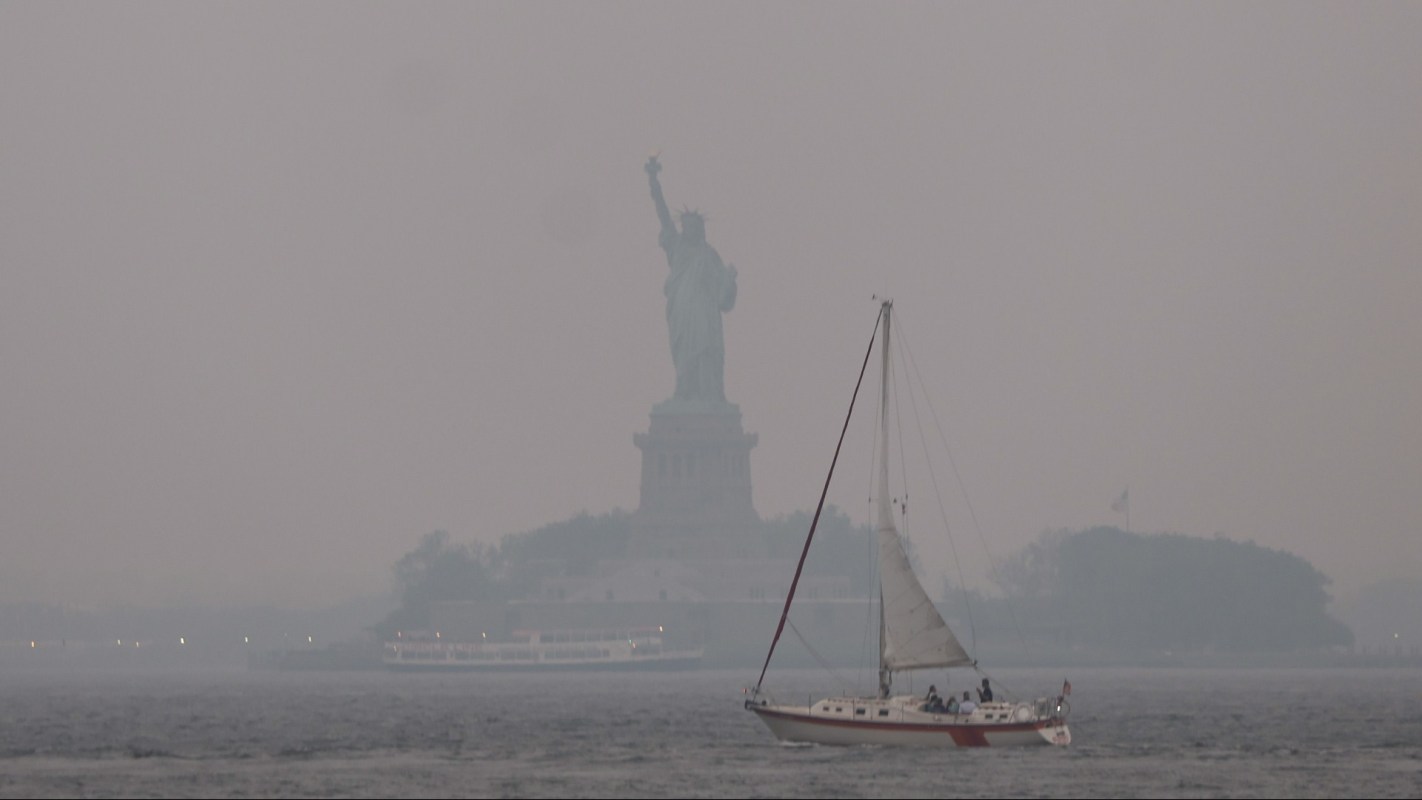I feel like a jerk saying it, but the smoke East Coasters are breathing this week may be the wake-up call this country needs. It's long past time we accepted that as a collection of individuals and communities, we have no rational choice except to significantly lower our pollution levels as quickly as possible.
East Coasters are currently getting a very small taste of what we've been living with in the West for the past ten years. Over 400 fires are burning in Canada, with 239 of them designated as out of control.
The wind is blowing the smoke south, and Air Quality Index (AQI) levels, which measure the rate of tiny pieces of pollution in the air that tear up human lungs, have reached the low 200s in New York, Philadelphia, Baltimore, and DC. I've heard from a number of friends saying that what they've experienced over the past couple of days is pretty, pretty crappy.
To this, I say, yeah, no sh*t!
The first time we had a real wildfire and smoke season in the Bay Area was in 2014. Many of us figured that it was a weird one-off because it had never happened before in our lifetimes (I'm almost 40).
That was … incorrect. Fires and smoke became the new norm every year, and fire season out west now stretches from July all the way to November.
For some perspective, during the fall of 2020 in San Francisco, the AQI was between 200 and 400 almost every day for an entire month. My wife and I had a two-year-old and a four-year-old at the time, and despite buying a number of air purifiers, our house was filled with smoke for weeks.

Photo Credit: Dave Finocchio
For a couple of days, it was so bad — and the kids were coughing so much — that we wore N95 masks inside. One day I went for an early morning bike ride with a friend, and so much smoke rolled in that the sun didn't really come out until noon.
These days we live in Bend, a small city in central Oregon. For a few consecutive days around Labor Day in 2021, the AQI levels here were above 500. The year before, it was even worse.
For those who haven't experienced it, when the AQI is around 200, plenty of people still go outside and just deal with bad air, even though it's not healthy to do so. But when it's above 300, being outside becomes pretty untenable without a mask. It's just super, super gross, and it will also cause serious long-term damage to most people's lungs, especially kids' lungs.
Beyond the negative health impact, what is especially brutal about wildfires and their smoke is that they usually hit during what are supposed to be the nicest times of the year. Many of us look forward to summer and fall after long winters. What happens when the nicest times of the year become the seasons you most dread? Again, it's really, really sh*tty.
In a previous life, I founded and ran Bleacher Report for almost 15 years. During the last five years of my tenure there, my wife and I consistently lived through wildfire and smoke seasons (while having babies), and the lightbulb went off in our heads that we are way, way too wasteful and polluting as a society.
And unless we make some rapid changes, our children's future is going to be much worse than the world we grew up in. What the East Coast is experiencing a bit of now, and what the West has been experiencing for a decade, is honestly no way to live.

Photo Credit: Dave Finocchio
Look, folks, there's no hiding from this. There's no great place to live where it's going to be someone else's problem. The impact of mass pollution is extreme weather, and we're all going to suffer greatly from it unless we wrap our heads around the necessity of moving toward a cleaner and healthier future.
These fires are ultimately caused by more extreme weather (in this case, heat and dryness) that is directly tied to an insane amount of carbon and methane pollution that humans produce every day.
This pollution comes from burning gas and oil to drive our cars, transport our goods, grow crops (especially crops to feed cows), fly our airplanes, heat the furnaces and water heaters in our houses, etc. This pollution is overheating our planet and creating warmer, drier conditions in which fires are more likely.
The good news is that there are technological solutions and many other best practices already available to individuals, corporations, and governments that would massively lower pollution levels if adopted at scale.
The bad news is that not enough people are taking this seriously enough, and our climate and our lifestyles are going to become irreversibly screwed if we don't accelerate progress on lowering pollution at a faster rate.
This isn't an overly alarmist political fear-mongering. I'm a moderate independent, and I tend to be pretty skeptical of government spending. But as an independent thinker, I've also educated myself about climate.
I hope some of you who've been sitting on the sidelines decide to do the same. There are better ways to do things that are going to lead to a brighter future. This is a good time to do more of them.
Dave Finocchio is the co-founder and CEO of The Cool Down, which he started with Anna Robertson and Ryan Alberti in 2021 to make it easier for consumers and businesses to make smart pro-climate decisions that will translate to lower pollution levels, better health, and cost savings.








